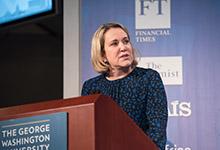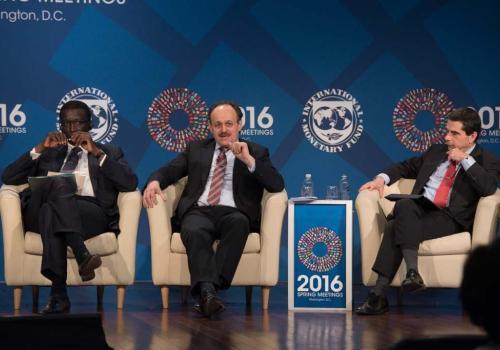
Typical street scene in Santa Ana, El Salvador. (Photo: iStock)
IMF Survey : Fiscal Capacity Development Can Boost Inclusive Growth
April 16, 2016
- Demand for capacity on taxation and spending on the rise
- Efficient public spending promotes inclusive growth
- International engagement and partnerships key to boosting capacity
Capacity development is essential for helping countries build strong fiscal institutions that are capable of supporting sustainable, inclusive growth and development, a recent seminar emphasized.

Cooperation, coordination, and partnership are vital elements of capacity building, IMF Deputy Managing Director Carla Grasso said (photo: IMF).
2016 IMF-WORLD BANK SPRING MEETINGS
Panelists at the IMF-World Bank Spring Meetings seminar “Collect More and Spend Better: The Role of Capacity Development” called for heightened partnerships among all stakeholders to respond to the growing demand for capacity development among many developing countries that seek to improve fiscal policy.
In opening remarks, IMF Managing Director Christine Lagarde highlighted the importance of building institutional capacity for stronger economic policies, inclusive growth, and rising living standards as the global community pursues the post-2015 development agenda.
“Last July at the Addis Ababa Summit, participants rallied behind the concept that domestic revenue mobilization was one of the most powerful ways to improve collections, improve sovereignty, and make sure that revenues were there to face the needs of public spending,” she said.
Cooperation, coordination, and partnership
All panelists recognized that the most effective response to the growing demand for capacity development was what IMF Deputy Managing Director Carla Grasso termed “cooperation, coordination, and partnership” across all stakeholders, including implementing countries, strategic development partners, and thought leaders.
Panelist Eric G. Postel of the United States Agency for International Development (USAID) considered capacity development an “underinvested” area, given the high demand for technical assistance and training by developing countries.
“We have to do more and you can see the benefits of doing more,” he said.
Klaus Rudischhauser, Acting Director General of the European Commission’s Directorate General for International Cooperation and Development (DG DEVCO) highlighted the importance of the European Commission’s “Collect More—Spend Better” Agenda in supporting developing countries in strengthening their public finances and achieving progress toward the Sustainable Development Goals (SDGs). On the revenue side, he pointed to the need for stepping up support on fighting tax evasion, tax avoidance, and illicit financial flows. On the expenditure side, he outlined the work that needs to be done in strengthening aggregate fiscal discipline, as well as capacities for strategic resources allocation and the efficient and effective use of resources. In this context, he also pointed to the importance of strengthening economic management institutions and the related human capacity development needs, and the role of the Commission’s strategic cooperation on capacity development with the IMF; he indicated that DG DEVCO will further strengthen this strategic partnership by contributing about €200 million to IMF capacity development initiatives.
Promoting equity
Nancy Birdsall of the Center for Global Development challenged the panelists to address the concern that domestic resource mobilization initiatives sometimes amount to taxing the poor. While recognizing the positive effects the IMF and its partners have on capacity development, she observed most developing countries had difficulty implementing tax systems that focus on getting more from corporate taxes and the wealthy.
Vitor Gaspar, Director of the IMF’s Fiscal Affairs Department, explained that the IMF program on capacity development was about equity. He noted that some countries subsidized energy products, which benefits the rich, and that this was most prevalent in countries where the state had low institutional capacity. On the contrary, he noted, strong tax compliance and capacity building under the domestic resource mobilization agenda allowed taxpayers to demand accountability on the use of resources.
“When you have governments that are accountable to the people, what you see politically is that distribution becomes more prominent and the poor in general get better protection,” said Gaspar.
Country experiences
IMF research shows, Gaspar noted, that countries should strive for a tax-to-GDP ratio of at least 15 percent, the minimum level necessary to support sustainable growth and development. Countries that collect above this threshold have a greater chance of triggering a “virtuous circle of development” as they build capacity, he said.
But approximately half of all low-income and developing countries fall below this 15 percent threshold, he added. “This is why the issue of taxation is at the core of our capacity development.”
Panelist Alonso Segura Vasi, Peru’s Minister of Economy and Finance, noted that his country has a tax-to-GDP ratio of about 20 percent, which is relatively low for a middle-income country. He described Peru’s recent efforts to carry out a comprehensive tax administration reform, involving strengthening the power of the tax authority to reduce tax evasion. Peru also introduced significant reforms to the taxation of mining companies, leading to an additional 1.5 to 2 percent of GDP in revenues. With the commodity price drop, that gain has unfortunately been wiped out, he said—but the improvements to Peru’s tax system remain.
Panelist Amadou Ba, Senegal’s Finance Minister, told the audience about his country’s recent experience with fiscal reform, which was implemented with IMF assistance. Getting policy recommendations is easy, he noted—it’s the “how” of carrying them out that matters. He discussed his country’s successful experience with “peer learning,” in which he and his staff apply the lessons from other countries’ experiences with reforms to their own situation.
“Peer learning helps you learn about the obstacles you might encounter as well as the measures that you must take to ensure the reform’s success,” Ba said.
Domenico Lombardi of the Center for International Governance Innovation moderated the seminar.

Left to right: Panelists Amadou Ba, Klaus Rudischhauser, and Vitor Gaspar







